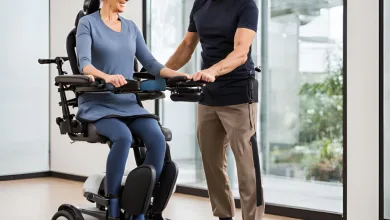Empowering Movement: Mobility Solutions for Parkinson’s Patients

Discover How Power Wheelchairs Are Changing Lives
Table of Contents
Discover how power wheelchairs enhance mobility for Parkinson’s patients. Explore features, benefits, and tips for choosing the right mobility solution.
Living with Parkinson’s disease can be challenging, especially when it comes to getting around. But here’s some good news: modern mobility solutions for Parkinson’s patients are making a big difference! In this guide, we’ll explore how power wheelchairs are helping people stay active, independent, and engaged in life. So, let’s dive in and discover how these amazing machines enhance the quality of life with power wheelchairs!
Understanding Parkinson’s and Mobility Challenges
Before we discuss power wheelchairs, let’s consider why they’re so important for people with Parkinson’s disease. Parkinson’s can make it hard to walk, balance, and move around easily. Mobility aids for Parkinson’s disease can help people get around more easily and safely, letting them do more of the things they love.
Power Wheelchairs: A Game-Changer for Parkinson’s Patients
Now, let’s get to the exciting part: power wheelchairs! These aren’t your grandpa’s old manual wheelchairs. Modern power wheelchairs are like mini-cars, packed with excellent features to help people with Parkinson’s. Let’s look at some of the best things about them:
- Easy to Control
One of the most incredible things about the best power wheelchairs for Parkinson’s is how easy they are to control. Many have joysticks that respond to small movements, making them perfect for people whose hands might shake a bit.
- Smart Technology
Some power wheelchairs are super bright! They have intelligent sensors that can detect obstacles and help you avoid bumps. It’s like having a tiny robot helper always looking out for you.
- Made Just for You
Everyone’s different. That’s why there are customizable power wheelchairs that can be set up just the way you like. Everything, from the seat to the controls, can be adjusted to fit perfectly.
- Speed Control
Feeling zippy one day and want to take it slow the next? No problem! Many power wheelchairs have adjustable speed controls in power wheelchairs, letting you go as fast or slow as you want.
- Comfy Seats
Sitting for a long time can be uncomfortable, but many power wheelchairs have supportive seating power wheelchairs that keep you comfy all day. Some even have seats that can move to help you change positions!
- Extra Safe
Safety is super important, and power wheelchairs have got it covered. Many have anti-tip wheels for power wheelchairs to keep you steady and automatic braking systems in power wheelchairs to help you stop safely.
- Keeping You in Place
For those times when you need a little extra support, many wheelchairs have adjustable restraints for wheelchairs. These help keep you secure and comfortable, especially when moving over bumpy ground.
The Big Benefits of Power Wheelchairs for Parkinson’s Patients
Now that we know about all the cool features let’s talk about why power wheelchairs are so great for people with Parkinson’s. Here are some of the most significant benefits of power wheelchairs for Parkinson’s:
- More Independence: With a power wheelchair, you can go where you want, when you want. It’s all about freedom!
- Less Tiredness: Moving around with Parkinson’s can be tiring. Power wheelchairs work hard for you, so you have more energy for fun stuff.
- Safer Moving: With all those safety features we discussed, power wheelchairs help prevent falls and accidents.
- Join In More: When it’s easier to get around, you can do more things with friends and family. That means more fun and less missing out!
- Feel More Confident: Knowing you can move around quickly can make you feel more sure of yourself. That’s a big deal!
Finding the Perfect Power Wheelchair
Okay, so power wheelchairs sound pretty awesome, right? But how do you choose the right one? Here are some tips to help you find the best power wheelchair for you or your loved one:
- Talk to Your Doctor: Your doctor knows your needs best and can give great advice on what features to look for.
- Try Before You Buy: If possible, test out different wheelchairs. It’s like trying on shoes – you want to find the perfect fit!
- Think About Your Home: Make sure your chosen wheelchair can fit through your doors and move around your home quickly.
- Consider Your Hobbies: Love gardening? Look for a wheelchair that can handle outdoor terrain. Movie buff? Make sure it’s comfy for prolonged sitting.
- Plan for the Future: Parkinson’s can change over time, so look for a wheelchair that can be adjusted as your needs change.
Excellent Tech in Modern Power Wheelchairs
Let’s geek out for a minute about some of the remarkable technological advancements in wheelchairs:
- GPS Navigation: Some wheelchairs have built-in GPS to help you find your way around. It’s like having a map in your chair!
- Smartphone Control: Imagine controlling your wheelchair with your phone. Some new models let you do just that!
- Terrain-Sensing Technology: These intelligent chairs can detect changes in the ground and adjust to keep you stable and comfy.
- Elevation Features: Some chairs can rise up, helping you reach high shelves or talk to people at eye level.
- Voice Control: For folks who have trouble using their hands, some wheelchairs respond to voice commands. How cool is that?
Staying Safe in Your Power Wheelchair
Safety is super important when using a power wheelchair. Here are some top safety features in power wheelchairs to look out for:
- Bright Lights: Many chairs have lights to help you see and be seen, especially at night.
- Seatbelts: Like in a car, seatbelts keep you secure in your chair.
- Speed Limiters: These let you set a maximum speed so you don’t accidentally go too fast.
- Emergency Stop Button: A big, easy-to-reach button that stops the chair immediately if needed.
- Waterproof Controls: A little rain shouldn’t stop you from going out!
Getting Out and About Using Your Power Wheelchair
Having a power wheelchair is excellent, but using it out in the world can take some practice. Here are some tips for improved mobility with power wheelchairs:
- Start Slow: Take time to get used to your chair in a safe place, like your home or backyard.
- Plan Your Routes: Before heading out, think about where you’re going and if there are any tricky spots.
- Carry a Phone: Always have a way to call for help if needed.
- Regular Maintenance: Keep your chair in tip-top shape with regular check-ups.
- Join a Group: Look for local groups of power wheelchair users. They often have excellent tips and support!
Paying for Your Power Wheelchair
Worried about the cost? Don’t be! There are lots of options for financial aid for power wheelchairs:
- Medicare: If your doctor says you need one, Medicare might help pay for your power wheelchair.
- Medicaid: Depending on your state, Medicaid might cover some or all of the cost.
- Veterans Benefits: If you’re a veteran, the VA might help you get a power wheelchair.
- Non-Profit Organizations: Some charities help people get the mobility equipment they need.
- Crowdfunding: Some people raise money online from friends, family, and kind strangers.
Learning to Use Your Power Wheelchair
Getting a new power wheelchair is exciting, but it can also be a bit scary at first. That’s why training for using power wheelchairs is so essential. Here’s what you might learn:
- Basic Controls: How to move forward, backward, and turn.
- Safety Features: How to use things like the emergency stop and seatbelt.
- Navigating Different Terrains: Practice on grass, sidewalks, and ramps.
- Charging Your Chair: Learn how to keep your battery powered up.
- Maintenance Tips: Simple things you can do to keep your chair in good shape.
Insurance and Power Wheelchairs
Figuring out insurance coverage for power wheelchairs can be tricky, but it’s worth it. Here are some tips:
- Check Your Policy: Look at what your insurance covers for “durable medical equipment.”
- Get a Prescription: Most insurance companies need a doctor’s order for a power wheelchair.
- Keep Records: Save all your medical records that show why you need a power wheelchair.
- Appeal If Needed: If insurance says no at first, you can often appeal the decision.
- Ask for Help: Social workers or patient advocates can help you navigate insurance.
Comfort is Key: Ergonomic Power Wheelchairs
Comfort is super important, especially if you’re using your wheelchair a lot. That’s why ergonomic power wheelchairs for seniors are so great. Here’s what makes them unique:
- Adjustable Seats: Can be moved to fit your body just right.
- Good Back Support: Helps keep your spine in a healthy position.
- Cushioned Armrests: Give your arms a comfy place to rest.
- Headrests: Some chairs have adjustable headrests for neck support.
- Leg Rests: Keep your legs comfortable and well-supported.
The Future of Power Wheelchairs
The world of power wheelchairs is constantly changing and getting better. Here are some cool things we might see in the future:
- Mind-Controlled Wheelchairs: Scientists are working on wheelchairs you can control with your thoughts!
- Self-Driving Wheelchairs: These are like self-driving cars but for wheelchairs.
- Ultra-Light Materials: Making wheelchairs that are super strong but very light.
- Advanced Suspension: For an even smoother, more comfortable ride.
- Augmented Reality Displays: Helping users navigate with cool, high-tech visuals.
Frequently Asked Questions (FAQs) About Mobility Solutions for Parkinson’s Patients
Q: What are mobility solutions for Parkinson’s patients?
A: Mobility solutions for Parkinson’s patients include various aids, such as power wheelchairs, walkers, and other devices designed to help with movement, balance, and independence.
Q: How do power wheelchairs help Parkinson’s patients?
A: Power wheelchairs for Parkinson’s patients enhance mobility without physical exertion, allowing users to move freely, participate in daily activities, and maintain independence.
Q: What makes power wheelchairs different from manual wheelchairs?
A: Unlike manual wheelchairs, power wheelchairs are motorized and offer features like intelligent sensors, adjustable speed controls, and customizable seating, making them easier to control and more comfortable for users.
Q: What are the key features to look for in a power wheelchair for Parkinson’s patients?
A: Look for supportive seating, anti-tip wheels, automatic braking systems, and adjustable restraints to ensure safety and comfort.
Q: Are there power wheelchairs with smart technology?
A: Yes, some power wheelchairs come with intelligent sensors that detect obstacles and help avoid bumps, adding an extra layer of safety.
Q: Can power wheelchairs be customized?
A: Absolutely; customizable power wheelchairs allow for adjustments to seating, controls, and other features to meet the user’s specific needs.
Q: Is financial aid available to purchase a power wheelchair?
A: Yes, there are various financial aid options for power wheelchairs, including insurance coverage, Medicare, Medicaid, veterans’ benefits, and support from non-profit organizations.
Q: How can one ensure the safety of a power wheelchair?
A: Ensuring safety involves regular maintenance, proper training in the use of the wheelchair, and utilizing built-in safety features like automatic braking systems and anti-tip wheels.
Q: What are the benefits of using a power wheelchair over a manual one?
A: Power wheelchairs offer enhanced mobility, reduced physical exertion, advanced safety features, and greater user independence.
Q: How does one learn to use a power wheelchair?
A: Manufacturers or healthcare providers often provide training for using power wheelchairs, covering basic controls, safety procedures, and navigating different terrains.
Q: Can insurance cover the cost of a power wheelchair?
A: Insurance coverage for power wheelchairs varies by policy, but many insurance plans, including Medicare, may cover part or all of the cost with a doctor’s prescription.
Q: What is the importance of ergonomic power wheelchairs for seniors?
A: Ergonomic power wheelchairs for seniors offer adjustable seats, good back support, cushioned armrests, and other features designed to maximize comfort and reduce strain.
Q: Are there advanced technological features in modern power wheelchairs?
A: Yes, modern power wheelchairs may include GPS navigation, smartphone control, terrain-sensing technology, elevation features, and voice control.
Q: How can one choose the best power wheelchair for their needs?
A: Consider factors like supportive seating, safety features, and ease of use, and consult with a healthcare professional to find the best power wheelchair for your specific needs.
Q: What should be considered when using a power wheelchair outside the home?
A: When using a power wheelchair outside, plan routes, carry a phone, start slow, and ensure the chair is well-maintained to handle different environments safely.
Conclusion: Embracing Life with a Power Wheelchair
Power wheelchairs are more than just a way to get around. They’re a ticket to freedom, independence, and enjoying life to the fullest. For people with Parkinson’s disease, these fantastic machines can open up a world of possibilities.
Remember, every person with Parkinson’s is unique, and finding the proper mobility solution might take some time and patience. But with all the fantastic options, from smart sensors to comfy seats, there’s sure to be a power wheelchair that’s perfect for you or your loved one.
So, whether you’re looking to zip around the neighbourhood, join friends for a day out, or move more easily around your home, a power wheelchair could be the key to unlocking new adventures and opportunities. Here’s to moving forward, staying active, and embracing all that life has to offer!
We hope you found this blog post informative and helpful. If you have any thoughts, experiences, or questions about mobility solutions for Parkinson’s patients, we would love to hear from you. Please leave your comments below in the comments section!



